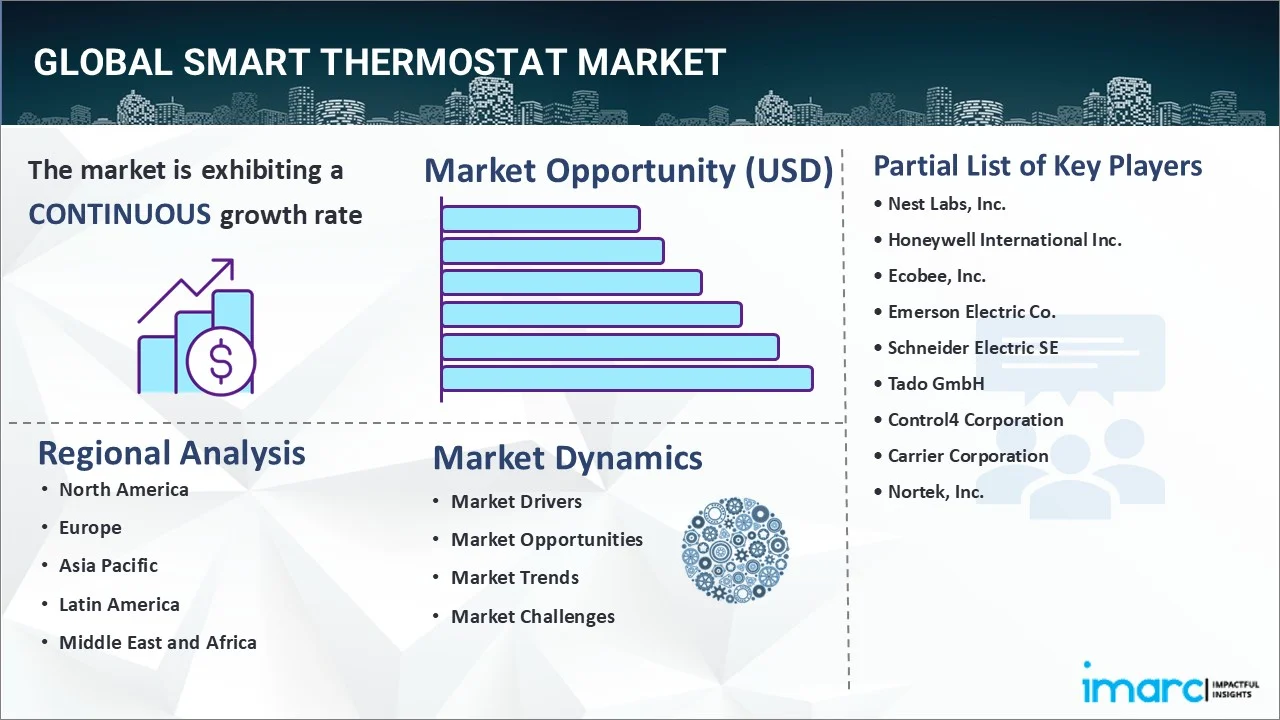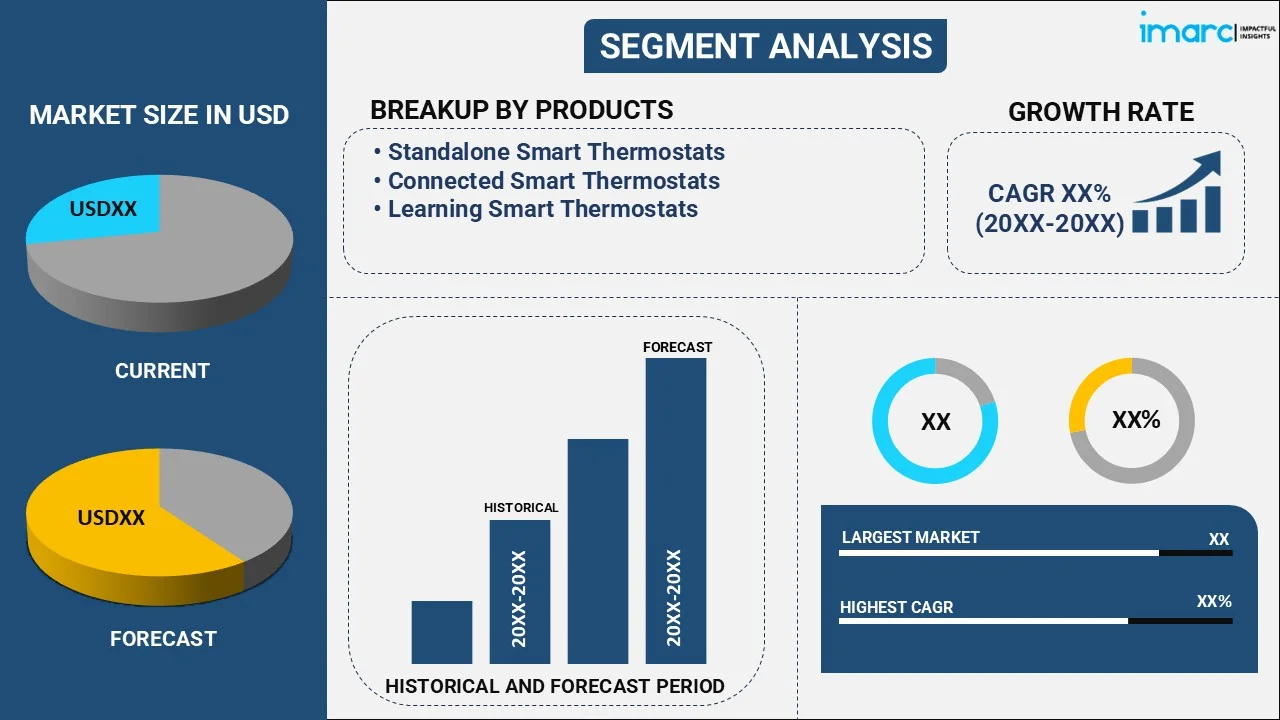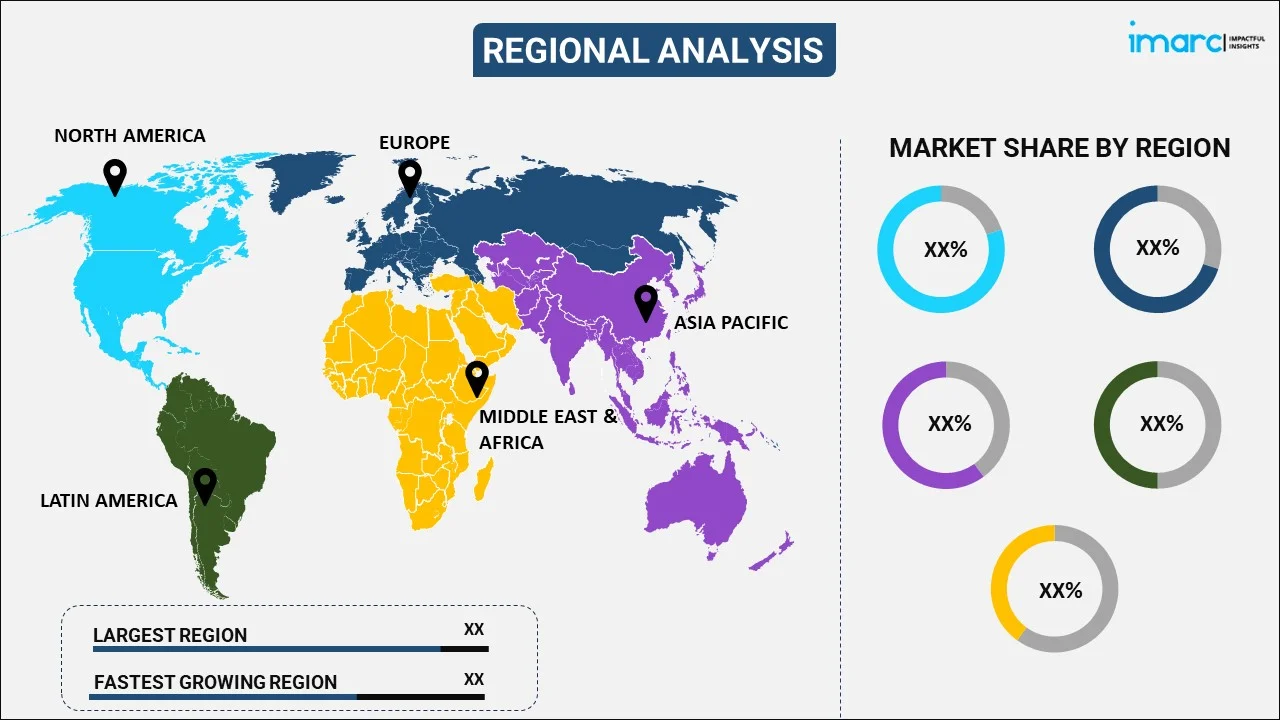
Smart Thermostat Market Report by Product (Standalone Smart Thermostats, Connected Smart Thermostats, Learning Smart Thermostats), Component (Display, Temperature Sensors, Humidity Sensors, Motion Sensors, and Others), Technology (Wired, Wireless), Application (Residential, Commercial, Industrial), and Region 2025-2033
Market Overview:
The global smart thermostat market size reached USD 4.2 Billion in 2024. Looking forward, IMARC Group expects the market to reach USD 15.8 Billion by 2033, exhibiting a growth rate (CAGR) of 15.67% during 2025-2033. The widespread product utilization in commercial buildings, the growing product adoption in industrial settings, extensive research and development (R&D) activities, and the implementation of supportive government policies are some of the major factors propelling the market.
|
Report Attribute
|
Key Statistics
|
|---|---|
|
Base Year
|
2024
|
|
Forecast Years
|
2025-2033
|
|
Historical Years
|
2019-2024
|
|
Market Size in 2024
|
USD 4.2 Billion |
|
Market Forecast in 2033
|
USD 15.8 Billion |
| Market Growth Rate 2025-2033 | 15.67% |
A smart thermostat refers to an advanced electronic device used to control and manage heating and cooling systems. It is comprised of several components, such as temperature sensors, display interface, occupancy sensors, connectivity module, microprocessor, and memory chip. A smart thermostat is widely used in households, commercial buildings, rental apartments, educational institutions, hotels, resorts, and government offices. It is a highly efficient device that provides remote access and control capabilities through smartphones and web interfaces. It also aids in saving energy, lowering utility bills, improving comfort, and creating a hospitable environment.

To get more information on this market, Request Sample
The rising emphasis on energy efficiency and cost savings is one of the factors propelling the market growth. Smart thermostats are widely used to optimize heating and cooling operations, which contributes to significant energy savings and lower utility bills. Furthermore, the increasing adoption of smart homes is facilitating the product demand as it can be easily integrated with other systems, such as voice assistants, smart lighting, and home security, to enable centralized control and enhance user convenience. Moreover, the widespread product adoption to reduce carbon footprint, minimize greenhouse gas (GHG) emissions, and promote sustainability due to the growing awareness regarding climate change and global warming is strengthening the market growth. Other factors, including rising expenditure capacities of consumers, increasing investment in the development of advanced products, and the rapid modernization of aging buildings, are anticipated to drive the market growth.
Smart Thermostat Market Trends/Drivers:
The widespread product utilization in the commercial buildings
Smart thermostats are widely used in commercial buildings to minimize energy wastage, lower utility bills, and achieve substantial energy savings. Furthermore, they enable precise zoning and temperature control in large commercial spaces, thus allowing different areas of the building to be heated or cooled individually. Additionally, smart thermostats can be integrated with building management systems to provide centralized control of heating, ventilation, and air conditioning (HVAC), security, and lighting systems in commercial spaces. Moreover, they are extensively used as part of demand response programs in commercial buildings to automatically adjust temperature settings during peak demand periods. Apart from this, they provide detailed analytics and reporting on energy usage, which aids in identifying opportunities for further energy optimization, implementing targeted energy-saving measures, and tracking the effectiveness of energy management strategies.
The growing product adoption in industrial settings
Smart thermostats are extensively used in industries to regulate the temperature of equipment, machinery, and industrial processes to ensure optimal performance, product quality, and safety. They play a crucial role in optimizing energy consumption by monitoring and controlling temperature settings in industrial spaces, such as warehouses, factories, and distribution centers. Furthermore, smart thermostats provide real-time monitoring, alerts, and automated control to ensure the optimal temperature range for equipment performance and longevity. Apart from this, they are equipped with environmental sensors that can monitor various factors, such as ambient temperature, humidity, and air quality, to ensure compliance with environmental standards. Besides this, smart thermostats contribute to predictive maintenance strategies by providing valuable data on temperature trends, equipment performance, and energy consumption, which aids in detecting anomalies and scheduling maintenance activities.
Extensive research and development (R&D) activities
The integration of advanced sensors that are capable of precise temperature measurement and occupancy detection, which aids in more efficient temperature control and energy savings, is positively influencing the market growth. Additionally, the incorporation of voice assistant features, which enable convenient and hands-free options to access thermostat features, is contributing to the market growth. Furthermore, the utilization of artificial intelligence (AI) and machine learning (ML) algorithms to learn user preferences, occupancy patterns, and environmental conditions to automatically optimize temperature settings, provide personalized comfort, and maximize energy efficiency is propelling the market growth. Apart from this, the integration of geofencing technology, which leverages the user location to automatically adjust temperature settings based on proximity, is favoring the market growth.
Smart Thermostat Industry Segmentation:
IMARC Group provides an analysis of the key trends in each segment of the global smart thermostat market report, along with forecasts at the global, and regional levels from 2025-2033. Our report has categorized the market based on product, component, technology, and application.
Breakup by Product:

- Standalone Smart Thermostats
- Connected Smart Thermostats
- Learning Smart Thermostats
Learning smart thermostats dominates the market
The report has provided a detailed breakup and analysis of the market based on the product. This includes standalone, connected, and learning smart thermostats. According to the report, learning smart thermostats represented the largest market segment.
Learning smart thermostats employ advanced algorithms and machine learning capabilities to automatically optimize temperature settings based on user preferences, occupancy patterns, and external factors. They are designed to maximize energy efficiency by creating personalized temperature schedules that align with user habits, thus reducing energy waste during unoccupied periods and optimizing comfort when needed. Furthermore, learning smart thermostats are capable of analyzing historical data, such as temperature adjustments and weather conditions, to anticipate and make accurate temperature adjustments without any manual interventions. Apart from this, they also feature user-friendly interfaces and intuitive controls, allowing users to adjust settings effortlessly.
Breakup by Component:
- Display
- Temperature Sensors
- Humidity Sensors
- Motion Sensors
- Others
The report has provided a detailed breakup and analysis of the market based on the component. This includes display, temperature sensors, humidity sensors, motion sensors, and others.
The display component holds a majority market share owing to its user-friendliness, which enables users to view and adjust temperature settings, create schedules, and receive feedback on system status. Furthermore, the display component provides real-time temperature monitoring capability, allowing users to easily view and assess the current temperature in their environment. Moreover, it offers access to data and graphs that display energy consumption patterns, which assist users in identifying opportunities for energy savings.
Temperature sensors are essential components of smart thermostats. They are designed to provide accurate and precise temperature measurements, which is crucial for maintaining optimum comfort levels and achieving high energy efficiency. Furthermore, temperature sensors play a vital role in optimizing heating and cooling operations to prevent unnecessary energy consumption and maintain the desired temperature.
Breakup by Technology:
- Wired
- Wireless
- WiFi
- Zig Bee
- Others
Wireless dominates the market
The report has provided a detailed breakup and analysis of the market based on the technology. This includes wired and wireless (WiFi, Zigbee, and others). According to the report, wireless represented the largest market segment.
Wireless technology is dominating the market due to its easy installation and flexibility, which eliminates the need for complex wiring and allows users to choose the optimal placement for thermostats. Additionally, it enables users to remotely control and monitor thermostats, adjust settings, create schedules, and receive real-time information and notifications, thus enhancing overall comfort and energy efficiency. Furthermore, wireless technology allows the seamless integration of smart thermostats with advanced home ecosystems, which aids in improving overall user experience and convenience. Moreover, it offers scalability and expandability options, allowing homeowners or building managers to add more units as needed without the constraints of wiring limitations.
Breakup by Application:
- Residential
- Commercial
- Industrial
Residential dominates the market
The report has provided a detailed breakup and analysis of the market based on the application. This includes residential, commercial, and industrial. According to the report, residential represented the largest market segment.
Smart thermostats are widely used in residential spaces owing to their ability to optimize comfort and enhance energy efficiency. Furthermore, they allow homeowners to customize settings, create personalized schedules, and set different temperatures for different rooms. Moreover, smart thermostats offer remote monitoring and control capabilities through smartphone applications, which allow occupants to adjust settings from anywhere and ensure a comfortable temperature remotely. Apart from this, they can adapt to learn user behavior, preferences, and temperature patterns over time, thus providing a comfortable environment without the need for constant manual adjustments. Additionally, the widespread product adoption in smart home applications is acting as another growth-inducing factor.
Breakup by Region:

- North America
- Europe
- Asia Pacific
- Middle East and Africa
- Latin America
Asia Pacific exhibits a clear dominance in the market, accounting for the largest smart thermostat market share
The report has also provided a comprehensive analysis of all the major regional markets, which include North America, Europe, Asia Pacific, Middle East and Africa, and Latin America. According to the report, Asia Pacific represented the largest market segment.
Asia Pacific is dominating the market due to the increasing construction of residential buildings and rapid urbanization activities. Furthermore, the presence of several key market players in the region, who are at the forefront of developing cutting-edge smart home technologies, including smart thermostats, is providing a boost to the market growth. Additionally, the implementation of supportive regulations by regional government to promote energy efficiency and sustainable development is contributing to the market growth. Moreover, the rising energy consumption due to economic growth and rapid industrialization activities is facilitating product demand to optimize energy usage and reduce carbon emissions. Apart from this, the growing number of smart city initiatives in the region is acting as another growth-inducing factor.
Competitive Landscape:
The top companies in the market are engaged in research and development (R&D) activities to introduce innovative features, improved user interfaces, and compatibility with smart home ecosystems. Furthermore, the growing partnership between leading companies, retail chains, HVAC contractors, and online marketplaces to ensure wider availability and easy access to their products is positively influencing the market growth. Additionally, several key players are collaborating with local distributors and service providers across the globe to strengthen their market presence and attract new customers. Apart from this, aggressive promotional and marketing activities by manufacturers through social media campaigns, advertisements, and digital marketing to improve brand visibility and create awareness about their product offerings are supporting the market growth.
The report has provided a comprehensive analysis of the competitive landscape in the market. Detailed profiles of all major companies have also been provided. Some of the key players in the market include:
- Nest Labs, Inc.
- Honeywell International Inc.
- Ecobee, Inc.
- Emerson Electric Co.
- Schneider Electric SE
- Tado GmbH
- Control4 Corporation
- Carrier Corporation
- Nortek, Inc.
Recent Developments:
- In October 2021, Nest Labs, Inc., now acquired by Google LLC formed a partnership with Portland General Electric (PGE) to simplify energy management at home by deploying new tools that support clean energy and aid customers in managing their heating and cooling electricity usage.
- In January 2023, Ecobee, Inc. announced its latest smart thermostats can easily be integrated with Generac home standby generators, thus creating a single energy management hub for the home.
- In March 2022, Emerson Electric Co. announced a partnership with Itron, Inc. to offer reliable smart thermostats for demand response programs.
Smart Thermostat Market Report Scope:
| Report Features | Details |
|---|---|
| Base Year of the Analysis | 2024 |
| Historical Period | 2019-2024 |
| Forecast Period | 2025-2033 |
| Units | Billion USD |
| Scope of the Report | Exploration of Historical and Forecast Trends, Industry Catalysts and Challenges, Segment-Wise Historical and Predictive Market Assessment:
|
| Products Covered | Standalone Smart Thermostats, Connected Smart Thermostats, Learning Smart Thermostats |
| Components Covered | Display, Temperature Sensors, Humidity Sensors, Motion Sensors, Others |
| Technologies Covered |
|
| Applications Covered | Residential, Commercial, Industrial |
| Regions Covered | Asia Pacific, Europe, North America, Latin America, Middle East and Africa |
| Companies Covered | Nest Labs, Inc., Honeywell International Inc., Ecobee, Inc., Emerson Electric Co., Schneider Electric SE, Tado GmbH, Control4 Corporation, Carrier Corporation and Nortek, Inc. |
| Customization Scope | 10% Free Customization |
| Post-Sale Analyst Support | 10-12 Weeks |
| Delivery Format | PDF and Excel through Email (We can also provide the editable version of the report in PPT/Word format on special request) |
Key Benefits for Stakeholders:
- IMARC’s report offers a comprehensive quantitative analysis of various market segments, historical and current market trends, market forecasts, and dynamics of the smart thermostat market from 2019-2033.
- The research study provides the latest information on the market drivers, challenges, and opportunities in the global smart thermostat market.
- The study maps the leading, as well as the fastest-growing, regional markets.
- Porter's five forces analysis assist stakeholders in assessing the impact of new entrants, competitive rivalry, supplier power, buyer power, and the threat of substitution. It helps stakeholders to analyze the level of competition within the smart thermostat industry and its attractiveness.
- Competitive landscape allows stakeholders to understand their competitive environment and provides an insight into the current positions of key players in the market.
Key Questions Answered in This Report
The global smart thermostat market was valued at USD 4.2 Billion in 2024.
We expect the global smart thermostat market to exhibit a CAGR of 15.67% during 2025-2033.
The rising integration of AI and ML with smart thermostat to learn user preferences, occupancy patterns, and environmental conditions to automatically optimize temperature settings, provide personalized comfort, and maximize energy efficiency, is primarily driving the global smart thermostat market.
The sudden outbreak of the COVID-19 pandemic had led to the implementation of stringent lockdown regulations across several nations, resulting in the temporary closure of numerous end-use industries for smart thermostat.
Based on the product, the global smart thermostat market can be segmented into standalone smart thermostats, connected smart thermostats, and learning smart thermostats. Among these, learning smart thermostats hold the majority of the total market share.
Based on the technology, the global smart thermostat market has been divided into wired and wireless, where wireless currently exhibits a clear dominance in the market.
Based on the application, the global smart thermostat market can be categorized into residential, commercial, and industrial. Currently, residential accounts for the largest market share.
On a regional level, the market has been classified into North America, Europe, Asia Pacific, Middle East and Africa, and Latin America, where Asia Pacific currently dominates the global market.
Some of the major players in the global smart thermostat market include Nest Labs, Inc., Honeywell International Inc., Ecobee, Inc., Emerson Electric Co., Schneider Electric SE, Tado GmbH, Control4 Corporation, Carrier Corporation, Nortek, Inc., etc.
Need more help?
- Speak to our experienced analysts for insights on the current market scenarios.
- Include additional segments and countries to customize the report as per your requirement.
- Gain an unparalleled competitive advantage in your domain by understanding how to utilize the report and positively impacting your operations and revenue.
- For further assistance, please connect with our analysts.
 Request Customization
Request Customization
 Speak to an Analyst
Speak to an Analyst
 Request Brochure
Request Brochure
 Inquire Before Buying
Inquire Before Buying




.webp)




.webp)












